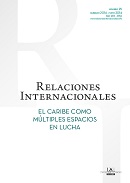Keywords:
West Indies , diaspora, intersectional, postcolonial , identityCopyright (c) 2014 Larisa PÉREZ FLORES

This work is licensed under a Creative Commons Attribution-NonCommercial-NoDerivatives 4.0 International License.
Abstract
An intersectional reflection about West Indian identity will be developed, taking as its starting point the work of the US/Antiguan writer Jamaica Kincaid. On the one hand, this paper will try to highlight the different elements that make this identity a diasporic identity, which was marked by a forced migratory process in its origins, and then by other migrations —which were apparently free— from the former Caribbean colonies to the old European mother countries and the new empires. On the other hand, this paper will attempt to draw the attention to the sociocultural and epistemological significance of the diaspora phenomenon. It is here argued that migratory phenomenon is the condition of possibility of the two unavoidable guidelines of current Social Sciences: post-colonial and intersectionality theories, whose core content will be displayed.
The aim of this paper is to show that the discussion that Jamaica Kincaid’s unknown women make us face is the main discussion that nowadays social theory, in general, and feminism, in particular, has to deal with. Far from a case study, and following the echoes of other West Indian migrants’ voices, the study will provide a detailed analysis of the way in which migrant, racial, economic, gender or sexual condition intersects in identity.





